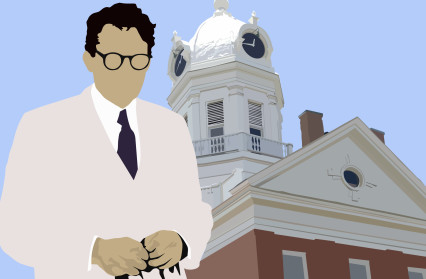Erin Z. Bass is Editor of Deep South Magazine
Like a lot of people, I was sceptical when I heard that a second book by Harper Lee had been discovered and would be published by Harper Collins. As the time for publication grew closer and excitement built up, I couldn’t resist the pull to drive to Monroeville, Alabama — her hometown — and take part in the launch. The first chapter of Go Set a Watchman released by The Wall Street Journal was surprisingly good, peppered with Lee’s signature wit and compelling descriptions of train travel and her beloved Scout, who now goes by Jean Louise Finch. Maybe this wasn’t such a bad thing, I thought.
In Monroeville, townspeople were excited to again see their home come to life as Maycomb on the page and seemed to fully support Watchman. I didn’t hear a negative word during the two and a half days I was in town. In fact, so many festivities were planned that I didn’t get a chance to properly sit down and read the book until I returned home. The first chapter remained a delight, but unfortunately the book went downhill from there. Chapter 2 had scenes that just didn’t make sense, and Scout’s flashbacks to her childhood sometimes seem disjointed from the rest of the novel. And then there’s the thing with Atticus.
Without getting into too much criticism, I’ll just say the book is in need of a good edit, which Harper Collins has said they did not do. At the time she wrote the book, I doubt Lee would have been comfortable with it being published in its current state. On the other hand, Watchman contains some beautiful scenes, memorable lines and a story that captures the mid-1950s and mood of race relations in small-town Alabama. It’s just a specific point in time and mood that’s hard to relate to today, especially the way it’s presented by Lee.
While Scout remains her lovable, courageous, outspoken self, we see a drastically different portrayal of Atticus — one the adult Scout is trying to wrap her head around. Lee’s message about daughters idolizing their fathers and failing to see them as flawed human beings is an important one that gets lost in a conversation about race and equality that’s a bit hard to follow. Again, some good feedback from an editor and tightening of dialogue to help Lee get her point across would have made a big difference.
In the end, I think if you read Watchman for what it is — a draft of a novel that wasn’t completely finished — you’ll be taking part in a piece of not just Southern literary history but literary history in general. Watchman isn’t a book like To Kill a Mockingbird that readers will come back to again and again, but it does provide insight into the Harper Lee fans have struggled to know and understand for years. As scholar Nancy Anderson, who spoke about the book in Monroeville, advises: “Keep your mind open, relax and enjoy the humour.”
Deep South Magazine will be holding a Twitter chat on Go Set a Watchman, tonight between 7 – 8pm UK time. More details here.












